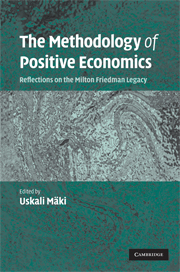Book contents
- Frontmatter
- Contents
- List of figures
- List of tables
- Contributors
- Preface
- Part 1 The classical essay in twentieth-century economic methodology
- The methodology of positive economics (1953)
- Part 2 Reading and writing a classic
- Part 3 Models, assumptions, predictions, evidence
- Part 4 Theoretical context: firm, money, expected utility, Walras and Marshall
- Part 5 Concluding perspectives
- Index
The methodology of positive economics (1953)
Published online by Cambridge University Press: 02 December 2009
- Frontmatter
- Contents
- List of figures
- List of tables
- Contributors
- Preface
- Part 1 The classical essay in twentieth-century economic methodology
- The methodology of positive economics (1953)
- Part 2 Reading and writing a classic
- Part 3 Models, assumptions, predictions, evidence
- Part 4 Theoretical context: firm, money, expected utility, Walras and Marshall
- Part 5 Concluding perspectives
- Index
Summary
In his admirable book on The Scope and Method of Political Economy John Neville Keynes distinguishes among “a positive science…[,] a body of systematized knowledge concerning what is, a normative or regulative science …[,] a body of systematized knowledge discussing criteria of what ought ot be …; an art … [,] a system of rules for the attainment of a given end”; comments that “confusion between them is common and has been the source of many mischievous errors”; and urges the importance of “recognizing a distinct positive science of political economy.”
This paper is concerned primarily with certain methodological problems that arise in constructing the “distinct positive science” Keynes called for —in particular, the problem how to decide whether a suggested hypothesis or theory should be tentatively accepted as part of the “body of systematized knowledge concerning what is.” But the confusion Keynes laments is still so rife and so much of a hindrance to the recognition that economics can be, and in part is, a positive science that it seems well to preface the main body of the paper with a few remarks about the relation between positive and normative economics.
THE RELATION BETWEEN POSITIVE AND NORMATIVE ECONOMICS
Confusion between positive and normative economics is to some extent inevitable. The subject matter of economics is regarded by almost everyone as vitally important to himself and within the range of his own experience and competence; it is the source of continous and extensive controversy and the occasion for frequent legislation.
- Type
- Chapter
- Information
- The Methodology of Positive EconomicsReflections on the Milton Friedman Legacy, pp. 3 - 44Publisher: Cambridge University PressPrint publication year: 2009
- 348
- Cited by

